Aug 27, 2024 Frankfurt ▶ Istanbul ▶ Gaziantep
Today, Sunim is traveling to Gaziantep, where JTS is conducting relief activities for the Turkey-Syria earthquake disaster recovery.
After completing his morning practice and meditation, Sunim had breakfast at the Airbnb accommodation at 4:50 AM and departed for Frankfurt Airport at 5:20 AM.
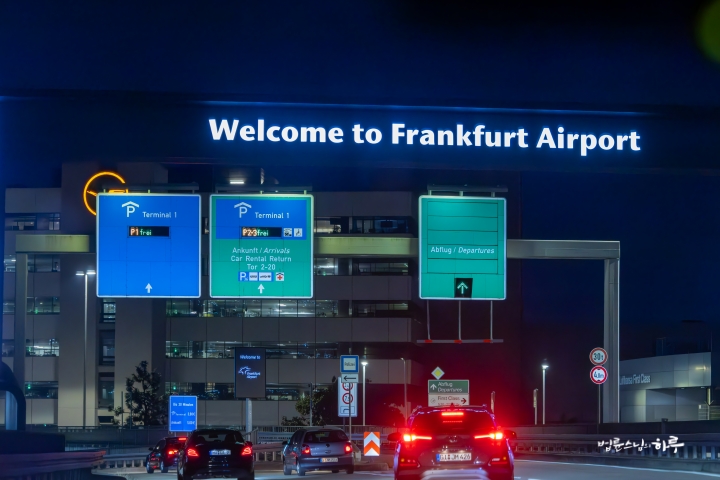
Sunim said goodbye and took a commemorative photo with Im Hye-ji, who accompanied and interpreted for him over the past four days, Choi Soon-jin, who drove, and Chu Hee-sook, who oversaw the Frankfurt lecture.
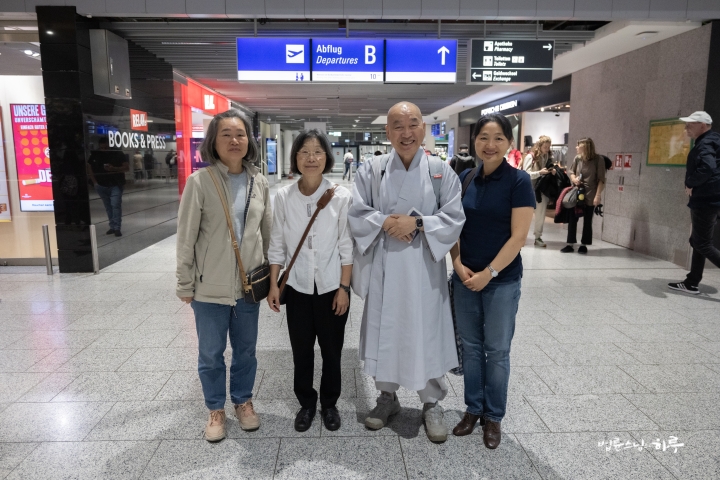
“Thank you all for your hard work. I appreciate it.”
“Take care, Sunim.”
After completing the departure procedures and boarding the plane, the flight scheduled for 8:00 AM was delayed by an hour and 30 minutes, taking off at 9:30 AM.

The plane that departed from Frankfurt Airport arrived at Istanbul Airport in Turkey at 1:30 PM local time after a 3-hour flight.
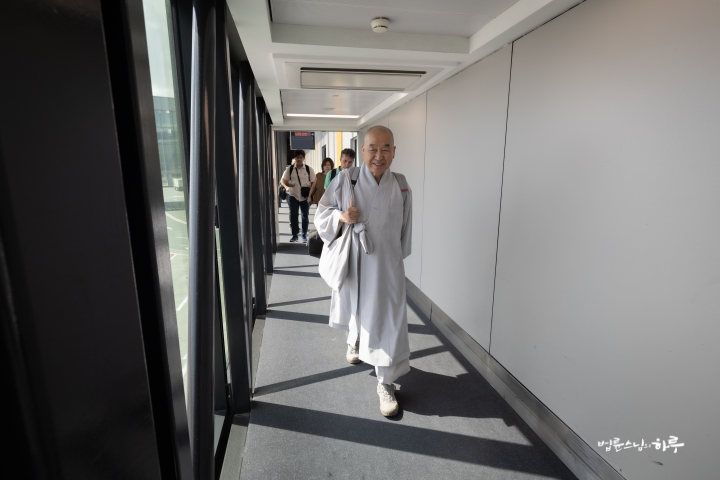
Time was tight between retrieving luggage, completing immigration procedures, and boarding the next flight. As soon as Sunim exited the plane, he rushed to the immigration hall. After asking for understanding from those in line, he completed the immigration procedures first, retrieved his luggage, and headed for the exit.
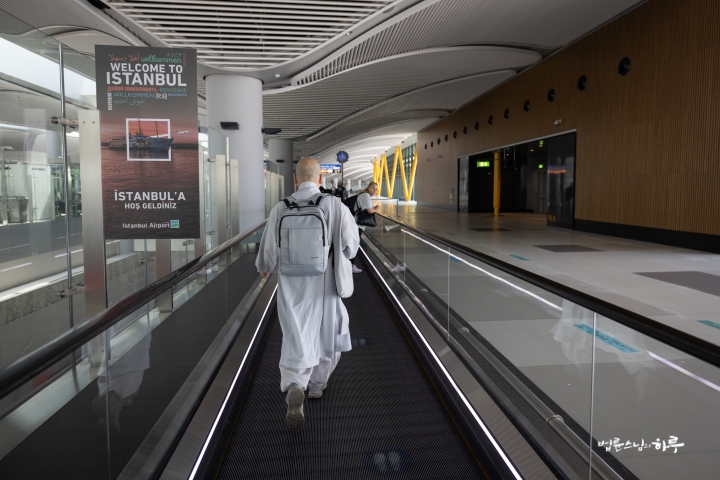
At the exit, JTS representative Park Ji-na and interpreter Wahab warmly welcomed Sunim.
“It’s good to see you.”
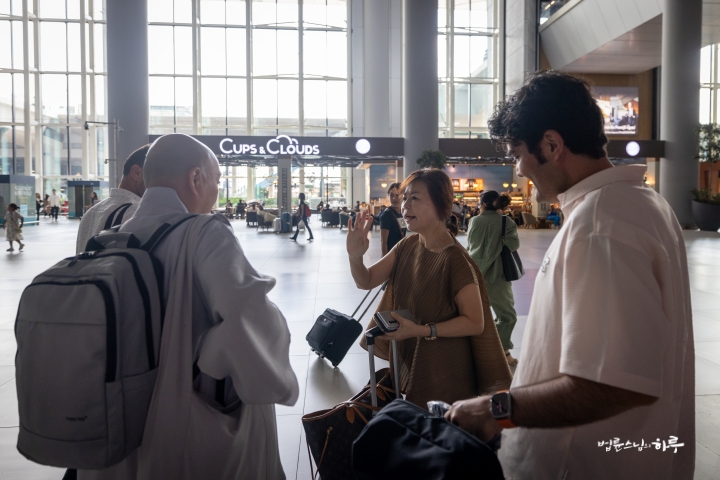
After greeting each other, they immediately moved to the boarding gate to catch the domestic flight.

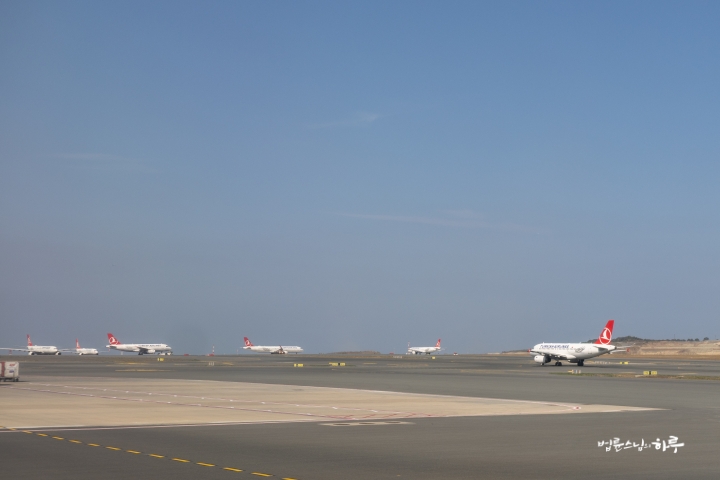
During the transit, Sunim had many conversations with Wahab about the earthquake recovery situation and the direction of JTS projects.


The plane that departed from Istanbul Airport at 3:20 PM arrived at Gaziantep Airport at 5:10 PM after a 1-hour and 50-minute flight.
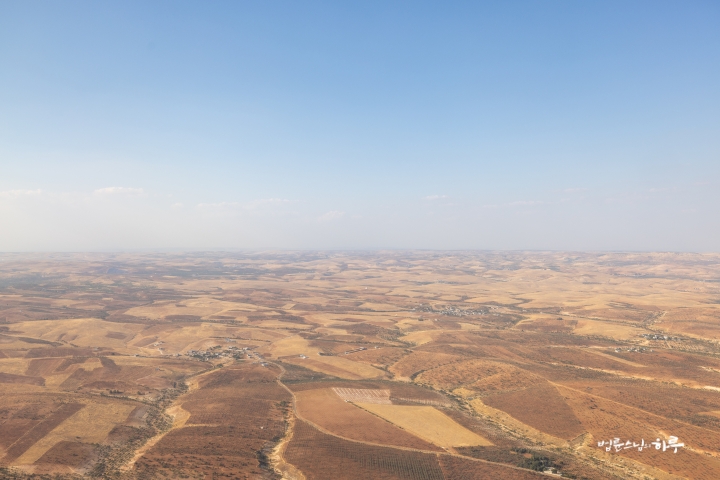
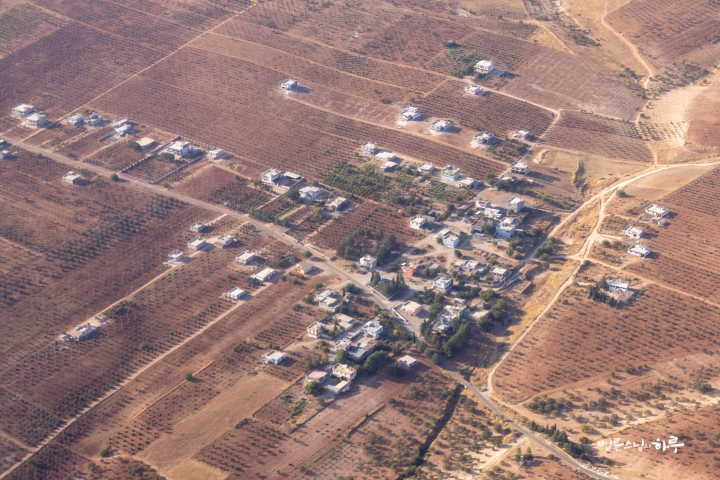
After retrieving the luggage and exiting the airport, a White Helmets activist, who is working with JTS on the earthquake recovery project, was there to welcome Sunim.
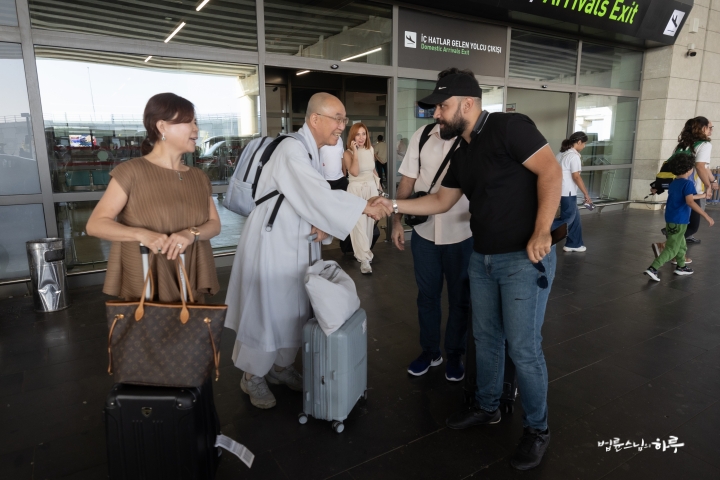
“Welcome to Gaziantep. We have been waiting for your visit for a long time. We are so happy to see you today.”
They exchanged warm handshakes and moved to the accommodation.
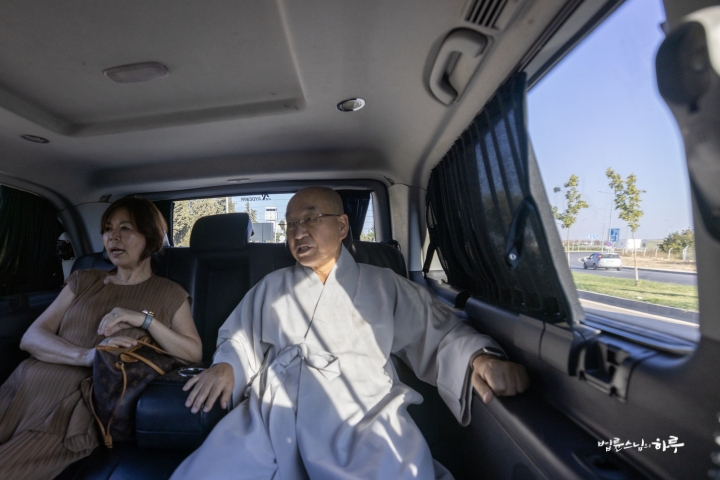
After unpacking at the accommodation, they moved to a restaurant to have dinner with White Helmets activists and discussed the earthquake recovery situation and tomorrow’s site visit schedule.
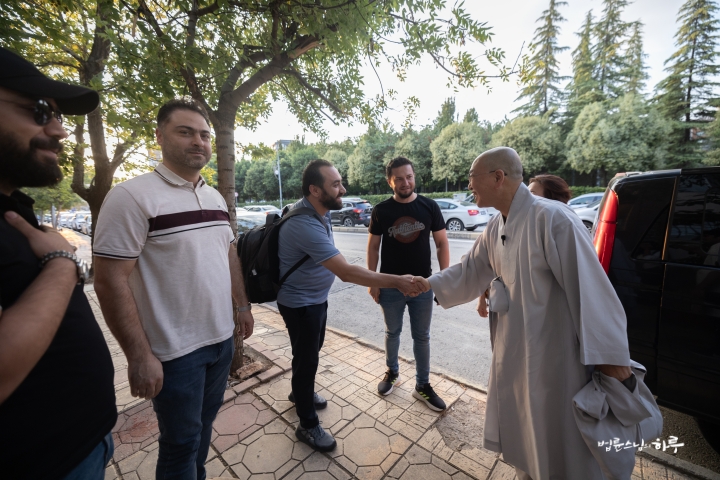
JTS, which has been helping with the recovery from the recent Turkey-Syria earthquake, is working with White Helmets to build a new school building for 3,500 students. In the presence of the project manager from White Helmets, the chief of school construction, and the head of Gaziantep, they had extensive discussions about the school construction situation and the difficulties people are facing after the earthquake.
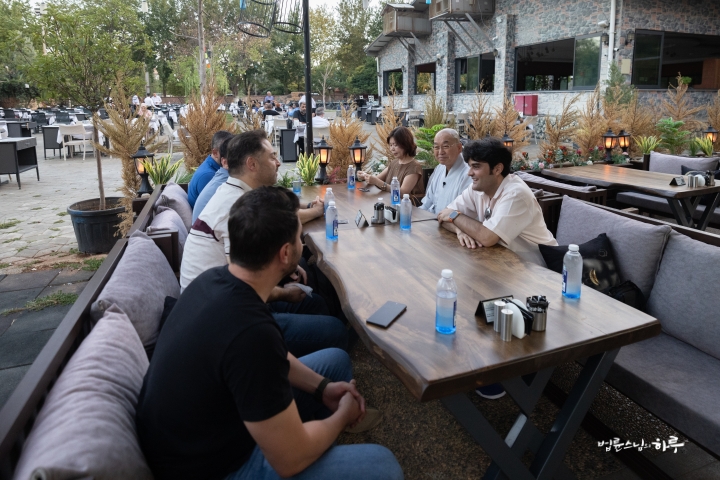
First, they shared their hopes for the war in Syria to end as soon as possible.
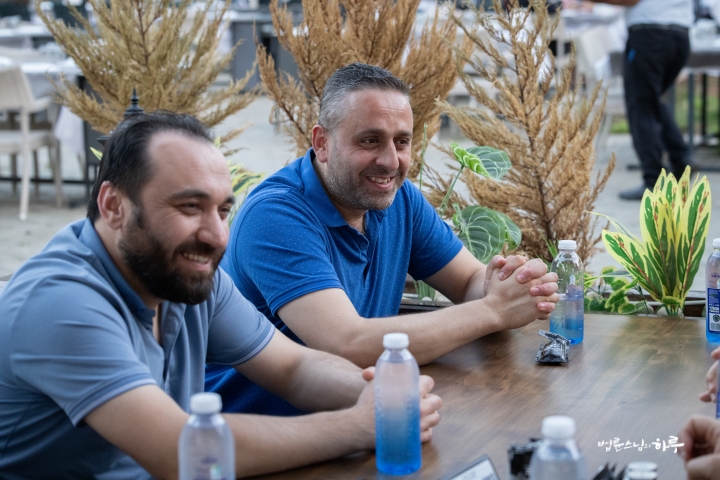
“You visited the Turkey-Syria border region for the first time last year. How was it?”
“I thought Syria was a desert, but when I actually went there, I saw that it was on the Mediterranean coast, with fields full of olive groves, and it looked peaceful. I thought it would have been a truly beautiful country if there had been no conflict. Also, I’m very interested in ancient civilizations like Assyria and Sumer, so I was glad to learn that Syria is a country that inherited such a deep historical civilization.”
“Thank you for seeing Syria in a positive light. Unfortunately, we can’t show you Syria’s beautiful natural environment and ancient civilization now because of the war. When the war stops, we would like to show you many cities with ancient civilizations. We hope that day comes soon.”
“I hope so too.”
Sunim encouraged the White Helmets activists who had worked hard to build the school under difficult conditions.
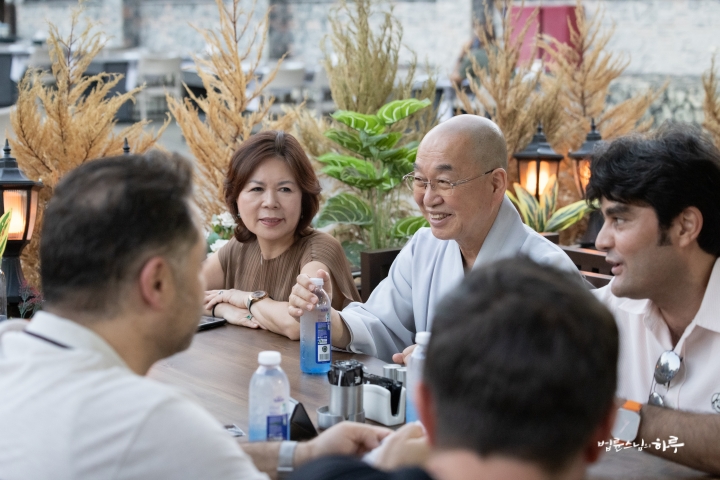
“Thank you for your hard work in building the school under difficult circumstances.”
“We are more grateful to you, Sunim. Without you, we couldn’t have even imagined building a school. Thanks to you and JTS, we were able to build a school where children can study and dream of the future. We are also very happy and proud. When we complete the school and start classes again, we plan to introduce Korean culture to the students and display materials introducing JTS, who supported us.”
As they continued their conversation, the sun began to set. Sunim suggested that when the school is completed, it would be good to create a small park to commemorate the teachers and students who were sacrificed in the earthquake.
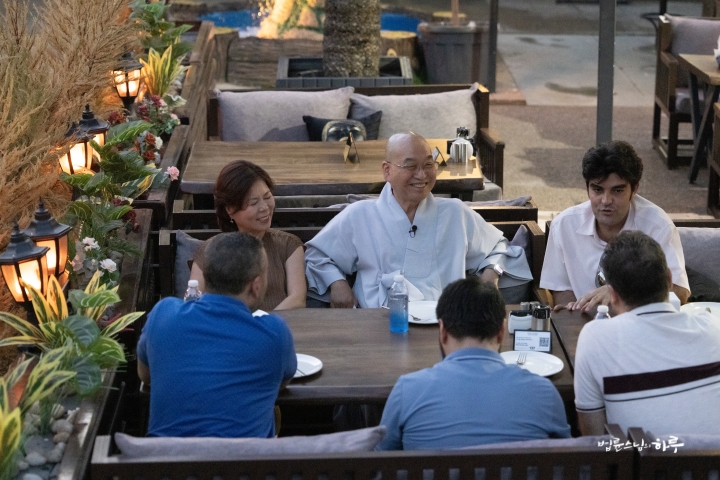
“Many children and teachers died in the earthquake. I hope that through the completion of the school, many people can overcome their wounds and have hope. So, how about creating a small memorial park to commemorate the students and teachers who were sacrificed in the earthquake? We could erect a monument and write the names of each victim, expressing our intention to carry on their will and develop this school in the future.”
“Yes, that’s a great suggestion. We will prepare for it.”
They continued to discuss how much progress has been made in the earthquake recovery. Sunim asked some questions.
“It’s been a year and six months since the earthquake damage. What’s the current situation? Have most schools been restored? Are students attending school normally? Are there more schools that need to be completely rebuilt because they were destroyed? What’s the situation with schools that have been partially repaired and are being used? Roughly, how much recovery has been achieved?”
The White Helmets activists explained the current situation.
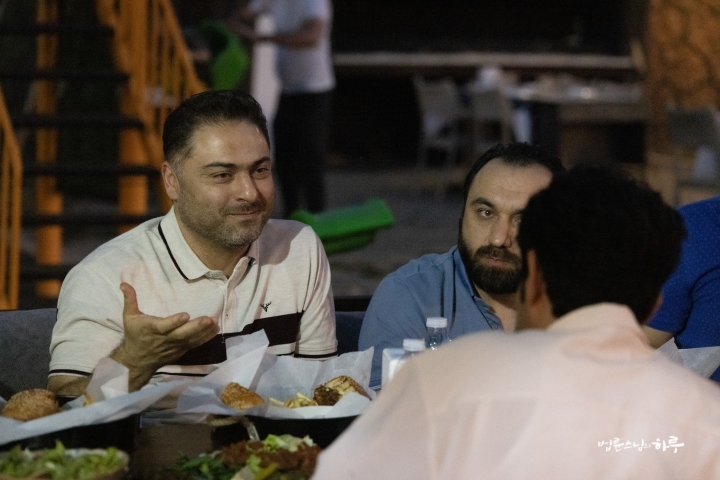
One Million Children Unable to Attend School After the Earthquake
“With the help of the international community, many earthquake-damaged school buildings have been restored, but most have only been repaired. About 20 percent still haven’t even been repaired. Especially in the case of students, compared to before the civil war, more than one million are not receiving education. The city of Idlib had a population of 150,000, but after the civil war, refugees gathered, and it became 900,000. However, the school buildings remain the same as before. According to statistics, 50 percent of children in northern Syria are not attending school. We need to build many new schools for these children. It’s a very serious situation, but officially, this problem is not being mentioned anywhere. We really need many new schools.”
Sunim asked more questions, and the conversation continued.
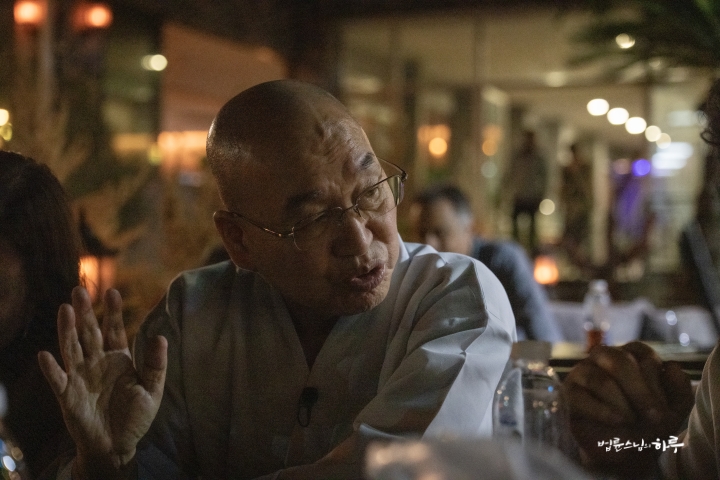
“A school doesn’t just need classrooms, it needs teachers. How do you plan to train teachers?”
“In the northern region of Syria, there were originally 2 million people living there, but after the earthquake, 3.5 million refugees gathered. Among them are many teachers. Currently, many teachers are being produced from education departments in universities, and we are confident that we can recruit many teachers if we look for them.”
“It would be best if we could solve all the children’s education problems at once, but realistically, we can only do a part of it due to budget and manpower shortages. So we need to set priorities. First, we should prioritize building elementary schools over middle schools. Second, instead of just trying to build buildings, we need to research expanding tent schools first. Third, even if people don’t have teaching certificates, it’s necessary to allow college graduates to become teachers with some training. By implementing this basic education first, we can gradually convert tent schools into building schools, or change temporary teachers into regular teachers. This is because we shouldn’t miss the timing for education.”
The White Helmets activists strongly agreed that more attention needs to be paid to education issues, as suggested by Sunim, noting that international support has been focused on food so far.
How to Solve the Education Problem for Children in Refugee Camps
Finally, Sunim proposed three things to concretize the direction of future projects.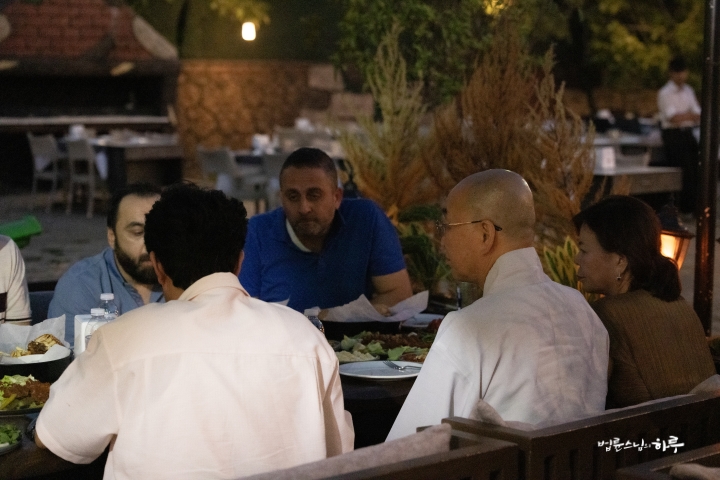
“Please prepare three things for our meeting the day after tomorrow. First, how to prepare for the school completion ceremony. Second, the current status of school building damage due to the earthquake, the recovery status, and what remaining tasks are there. Third, how to solve the education problem for 3.5 million refugee children. I’d like to have a lot of discussion about these.
Building school buildings is important, but we need to make sure children don’t miss their education timing. Whether under a tree or in a tent, the most important thing is to allow children to receive education first. If we want to solve the children’s education problem quickly but it’s really difficult to find teachers, we need to consider using online technology for education. We can create one regular school where excellent teachers provide high-quality education, and connect hundreds of other schools online to listen to those classes. Instead, we need one assistant teacher in each classroom to play videos, give assignments, and manage the children. By introducing online technology like this, it’s possible to have tens of thousands of students receive high-quality classes at once. With just one assistant teacher in one tent school, we can open a school anywhere, so we can provide education to many students at a fast pace.”
“Many refugee camps don’t have internet.”
“There’s a satellite internet service called ‘Starlink’ that receives internet data from satellites. Couldn’t we use that well?”
“The ideas you’ve given us are really good, Sunim. However, since there is almost no infrastructure in place, we need to build the infrastructure while solving the children’s education problems. We haven’t thought much about the education problem yet.”
“Okay. Let’s talk a lot about these issues the day after tomorrow.”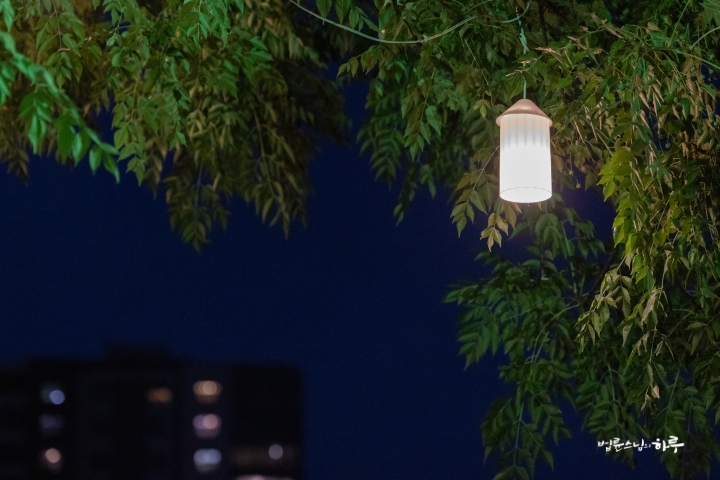
After requesting to see a few more schools that haven’t been repaired and are under repair in addition to the school JTS is building during tomorrow’s site visit, the conversation ended.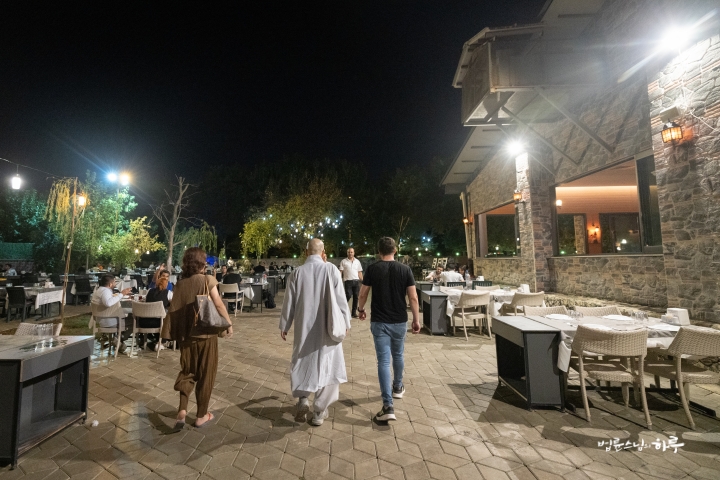
When they returned to the accommodation after the conversation, it was well past 9 PM. Sunim reviewed manuscript corrections and other work before going to bed.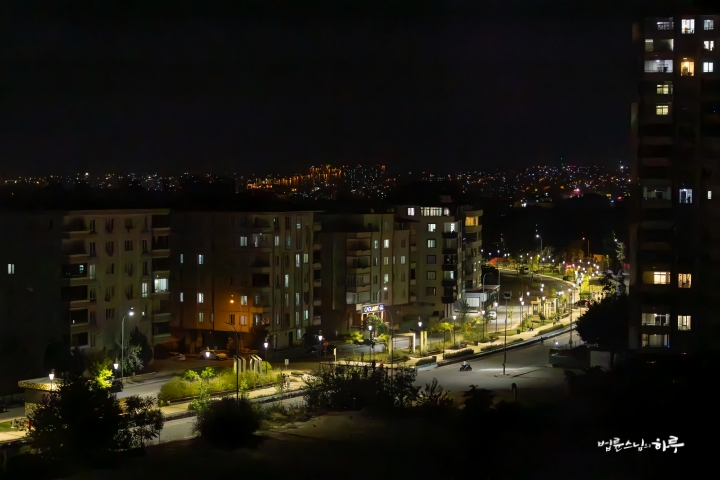
As there was no Dharma talk today, I will conclude this post by introducing a conversation between a questioner and Sunim from the Dharma Q&A held in Zurich, Switzerland the day before yesterday.

After Divorcing My Husband, I’m Constantly Plagued by Regret and Guilt
“If you keep thinking ‘the other person did wrong,’ you’ll end up hating them. Conversely, thinking ‘I did wrong’ and hating yourself leads to self-blame and regret.
You might wish ‘if only he wouldn’t drink,’ but what can you do if that’s beyond his capacity? It’s because you keep wanting something that’s not possible that you develop resentment. You might think ‘if only I had a little more self-esteem’ or ‘if only I had been more open-minded,’ but at your level at that time, you couldn’t do that, could you? That kind of thinking is called ‘delusion of grandeur.’
Some people get extremely upset when they feel criticized. They become very distressed if they hear others talking about them behind their back. Then I ask them, ‘Are you better than the Buddha?’ They answer ‘No.’ Even the Buddha, whom we consider an admirable figure, had people who criticized and insulted him during his time. Jesus wasn’t just insulted; he was crucified for being accused of misleading the masses. So who do you think you are to expect not to be criticized? That’s why it’s called a delusion of grandeur.
You always feel regret thinking ‘if only I had done a little better,’ but in reality, you couldn’t do that ‘little better,’ could you? So saying ‘if only he had done a little better, we wouldn’t have divorced’ and ‘if only I had done a little better, we wouldn’t have divorced’ are essentially the same thing.

You might think you’ve improved a bit, but you haven’t improved at all. It’s the same. The only difference is that you’ve shifted the responsibility for the divorce from the other person to yourself. Whether you’re suffering while hating others or suffering while hating yourself, it’s the same. What improvement is there? You’ve just moved the blame from one place to another. Saying things like ‘It happened because I was lacking’ or ‘If only I hadn’t made that mistake then’ is unnecessary and all in the past. The fact is, you made mistakes then, right? Just acknowledge the fact: ‘Yes, I was foolish then and got divorced.’ That should be the end of it. If you meet someone new in the future, you can use this as a reference and think, ‘I should be a little less foolish.’
Also, it seems that back then you were consumed by negative emotions and couldn’t see the good in that person, but now that you’ve separated, you’re starting to notice their good qualities again. It’s like the old saying, ‘I don’t want to eat it, but I don’t want to give it away either.’ Now that you’ve given it up, you’re realizing its value. We often don’t appreciate what we have until we lose it. Everyone has both good and bad qualities. When we’re together, we take the good for granted and only see the bad. When we separate, we don’t see the bad and only remember the good. So there’s no need to dwell on these feelings. If you still have lingering feelings, you can just call and be honest about it.
‘Honey, let’s get back together. I’m sorry. I was wrong. I didn’t recognize your good qualities. I was crazy to throw away such a precious gem, but now I realize there’s no one better than you. I want to apologize.’
You can just speak honestly like this. If you have lingering feelings, you should try your best to make another attempt. Don’t worry about saving face. You need to do this so you won’t have any regrets. Only after you’ve tried and concluded ‘Even if I try again, it’s no use’ can you move on without regret, whether you choose to live alone or become interested in someone else. If you keep holding onto these feelings, you’ll keep regretting ‘I should have tried harder then,’ and it will continue to affect your life. So if you have lingering feelings, you should look at yourself rather than the other person. Instead of focusing on things like ‘He drinks’ or ‘He cheats’ and hoping the other person will change, you should change your perspective to ‘Even considering all of that, this person is beneficial to me.’
At first, you thought you were marrying someone who was perfect, but living together, you realized they were only 70 points out of 100. So you got divorced and tried to find someone else, but you only found 50-point options. That’s why you end up regretting after the divorce. It’s like buying a car thinking it was perfect, but after getting some scratches, it’s only worth 70 points. You put it up for sale in the used car market and went to look at other used cars, but you couldn’t find anything as good. Should you buy another used car? Or should you have kept the original car?” (Laughter)
“You should have kept the original car.”
“That’s why you should always think carefully and not make emotional decisions when separating. After all, other used cars have been driven by other people too. If you’re not going to buy a new car, isn’t the used car you’ve driven for a long time better? Is a used car that someone else has driven a lot better?
I’m talking about why regret occurs. You made hasty decisions when getting married, only seeing the good points, so when you actually live together, you end up with regrets. When getting divorced, you only see the bad points and make a rash decision. If you’ve reflected on not thinking enough when getting married, shouldn’t you be more careful when deciding to divorce? But you’re repeating the same mistake without sufficient consideration. Why regret twice? You might have not known the first time, but shouldn’t you be a little wiser the second time with experience?
I’m not telling you to get divorced or not to get divorced. I’m saying that because you were less careful when getting married, you should be more careful when getting divorced. Whether you get married or divorced, is it really that important in the grand scheme of things? Does it matter which animal mates with which in the mountains? Looking at the entire natural ecosystem, it’s not important at all. Whether you live with this animal or that animal, or change partners ten times, I don’t consider these things important. That’s why I don’t tell people not to get divorced. I’m just checking in because you’ve already regretted making a mistake when getting married, and now you’re about to make the same mistake when getting divorced and regret it again.
I’m telling you not to repeat the same foolish mistake, but you’re interpreting it as me telling you not to get divorced. I’m not particularly interested in whether you get married, get divorced, make money, or don’t make money. I’m giving you a few words of advice because you’re suffering over these issues. You shouldn’t suffer whether you’re married or divorced. You shouldn’t suffer whether you’re living alone or with someone. If you’re not suffering, there’s no problem. Even if you change partners every day, if you’re not suffering, that’s fine too. It’s your freedom, as long as you’re not harming others. But your problem is that you make choices and then suffer without taking responsibility for them.
It’s contradictory if you choose to come to Switzerland because you want to, even though you could live in Korea, and then complain about Switzerland. Similarly, isn’t it contradictory to choose someone you thought was the best out of numerous men, and then call them a bad person? That’s why I find you ridiculous for calling the person you chose a bad person. How can I trust your judgment, and how can I trust your state of mind?
So even if you’ve divorced, you shouldn’t badmouth your ex-partner. You can separate because you’re not compatible. But there’s no reason to insult the other person. What would happen if a child constantly insulted their parents? Children don’t just inherit physical traits from their parents, but also many mental aspects. So if you say your parents are bad people, you’re implying that those bad traits have been passed on to you. That’s why your self-esteem drops. How can someone who thinks their parents are bad people have self-esteem?
If you tell your spouse, ‘You’re worse than an animal,’ you’re implying that your child is also worse than an animal. That’s why you shouldn’t insult your wife or husband. If you don’t have children, you can insult your spouse. But if you have children, those children become the offspring of animals. In the end, you’re insulting yourself. It’s an act that destroys your own self-esteem.
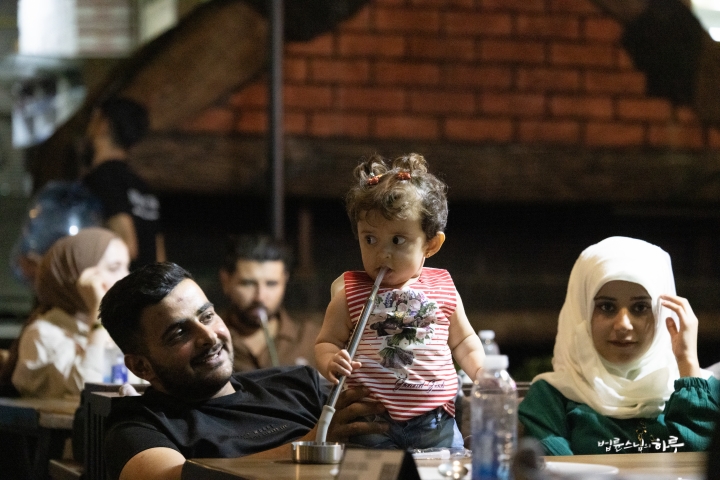
Even after divorce, if you insult your ex-spouse in front of your children, it destroys their self-esteem. When others insult your parents, it may or may not hurt because you can think they’re mistaken. But when a parent insults their spouse, for example, if a mother insults the father, if it’s true, the father becomes a bad person, and if it’s false, the mother becomes a bad person because she’s lying. Either way, it causes a mental split in the child. That’s why parents should avoid hurting their children. Divorce is a freedom, but you should never criticize your wife or husband in front of your children. Always tell your children, ‘It’s because I was lacking. Your father was a good person.’ This is good for you, good for your ex-husband, and good for your children. If you’re wise, you should take the path that’s good for everyone. It’s not necessarily the divorce itself that hurts children. It’s the criticism and hatred towards the ex-spouse that hurts them.”
“Thank you. I understand well.”
Tomorrow, after broadcasting a live practice session from the lodging at 4 AM, we will move to the border area to inspect the earthquake damage recovery site, visit the school building that JTS is constructing, meet with White Helmet activists, and then return to Gaziantep.




